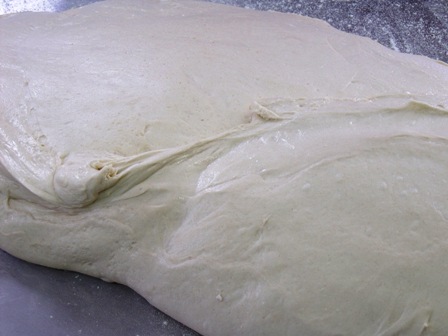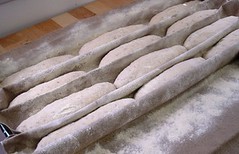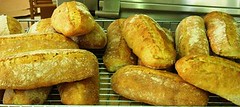I have been working with Mary and Nigel for about 18 months now, providing Consultancy services to help them get their cherished bakery project off the ground.
I first met these dedicated Francophiles when they attended the Breadmatters Masterclass in early Summer 2007. We discussed their project to establish a genuine local bakery in their adopted village of Wye in Kent. The High Street has a load of potential, and, eventually they came back to me to say they had bought premises and the project was moving. Alison, my wife, and I went to Kent over the Bank Holiday of 2008, giving me some time to experiment with Mary and Nigel using the specialist type 65 flour they had sourced from one of their many trips made to France. We made some fantastic Pain de Campagne.
I should add that Mary had worked in Brussels, whilst Nigel had been involved in Aid and Development work in Africa, having lived in New York for sometime, based at the UN. I put this blog together, because there are some excellent discussions to be found on the site at the moment in relation to flour combinations which people like to use. A lot seem to centre on creating a flour mix which equates to the French ash content, aiming for somewhere near to Type 65, or, maybe 80.
On my second visit, Mary and Nigel had done the ground work and were preparing to start production in their lovely new bakery. It had been far from plain sailing, as the project was based in the relatively modern extension built on the back of a High Street building which was an integral part of the village conservation area. They had a new spiral mixer, and an upright mixer which was wired to continental standards, and gave me a scary electric shock early on. They also had a sparkly new 3 deck oven and some big peels!
As you may imagine, creating a top baguette was a high priority. The same with croissant. Mary and Nigel had just returned from a week long intensive craft baking course with the French Baking Institute. They were itching to turn their knowledge, and new skills to creating perfect specimens. Well, I think we did well, and I know Mary and Nigel were very happy with the progress we made that Bank Holiday weekend. Perfect baguettes and croissants, no! But so much progress. Lots of photos attached for you all to see.
These good people opened for trade very soon after. They are now working flat out, and doing really well. I heard about queues reaching out onto the High Street. Committed to the cause of real bread, and dedicated to the entrenched passion and tradition of French baking, I am sure they will succeed and prosper.
Best wishes to all, especially those friends in Kent!
Andy
ps. I originally had it in mind to try and show what was so different about dough made with real French flour. I don't know how successful I have been. I'm not that dedicated to the French cause, myself, and like to make a whole range of different breads from different flours, but I thought these photos do give a reasonable indication of what French flour gives, in terms of both dough, and finished product. There were some really special qualities to what we achieved in such a small amount of time.










- ananda's Blog
- Log in or register to post comments
Stories like this are warm and exhilarating - there is plenty of hard work but satisfying. In the end, I see a way of life in Mary and Nigel's pursuit. This way of life (I mean, as village bakers) will never be mine (I would never be a professional baker for a million years, but that's beside the point). This way of life, as I see it, centres on their living, and through sharing with people the fruits of their passion, I can see a very fulfilling life. I wish them every success.
Thank you for your post.
Shiao-Ping
Andy,
You covered a lot of territory in your post. It's nice that these young people who needed you guidance were able to find the help they needed.
We see a lot of beautiful breads here and the ones you showed us are indeed top notch. I especially enjoyed the images of the dough.
For the last few years I and I'm sure many others have been trying to make great French style breads with the flours available here in the US. Part of me is convinced that I can make bread every bit as good as the best available in Europe. The other part of me thinks life would be better if only I could find a regular supply for French style flours.
Another contributor here who lives in France tells me that most of the flours available for sale near her are not high quality. The reports of the decline of good bread in Europe is both good and bad. Bad because it is evidence of an attitude that it doesn't matter what is sold to the public. Good because it gives opportunity to the small artisan bakery who take pride in the quality of their breads. The public will know the difference and flock to the good ones.
Thanks for sharing this story Andy.
Eric
Very good post Andy thanks for sharing it with us.
What flours have you been able to use at your college or is it just in your personal persuit that you have dabbled into foreign flours.
Regards YOZZA
Hi Yozza,
Thank you for replying to my latest blog entry.
I should refer you immediately to the post I made earlier: http://www.thefreshloaf.com/node/15974/sour-dough-leaven-refreshment-and-ash-content
The end section of this explains how I have been using local English flours in my practical classes with students.
Personally, I have been involved with using a range of flours over the past 22 years. The small bakery we started back in the late 1980s used flour from a local watermill. At the time it really was totally unique, and it is still going strong as a small brand. The flour was all stoneground, milled entirely from Organic English Wheat. Most of the grain was actually grown Biodynamically. Given it was grown in the harsh climate of the North of England, the wheat did not produce flour most obviously conducive to breadmaking. A few summers in the early 1990s were exceptionally poor, even by our standards. Added to this, the mill occasionally struggled to meet wholesale supply, despite us being a very small bakery; 20 bags a week [32kg, in those days] was our maximum. However, the bread we made was totally unique, and word soon got round the city about what we were up to.
The Village Bakery, Melmerby, where I worked from 1994 to 2003 used flour from Shipton Mill in Gloucestershire, in SW England. They mill what is my favourite organic breadmaking flour available over here. It is not easy for me to source as a homebaker, but I can get it mailorder these days, which is great.
I was invited to visit Carrs flour mills in Silloth, Cumbria a couple of years ago. These people mill for Warburtons Bakers, an extremely successful plant baking company over here. Well, I'm not that keen on the bread, but the flour specification is about as good as it gets, given the company employ farmers in Canada to grow their grain to a given specification on a contract basis. So the combination of premium bread flours, plus a local speciality range means I can engage students at all levels.
The rye flour I have generally used is from Shipton, and is grown on the Duchy Estate by the Prince of Wales, and it is all organic.
I'm afraid that I have very limited experience of using French flours. That said, you can probably infer from my blog entry that I thoroughly enjoyed my experience of using speciality French flour to produce the high quality dough which you can see in the photos. I think, when flour is milled on a micro level in France, is that it is milled to ash content, and there is something slightly different about this than the extraction system we use. I am not being in any way critical of combine mills here. The flour Carrs produce is fantastic, in terms of the performance I expect from it, and get! But, when you have a lot of experience of mixing dough, there are different facets you can see in the doughs shown in this post, in the doughs i have made using local English wheatflour and in the doughs using premium roller-milled flours. i appreciate them all, and try to have an authentic baking experience with whichever one I happen to be using.
Best wishes
Andy